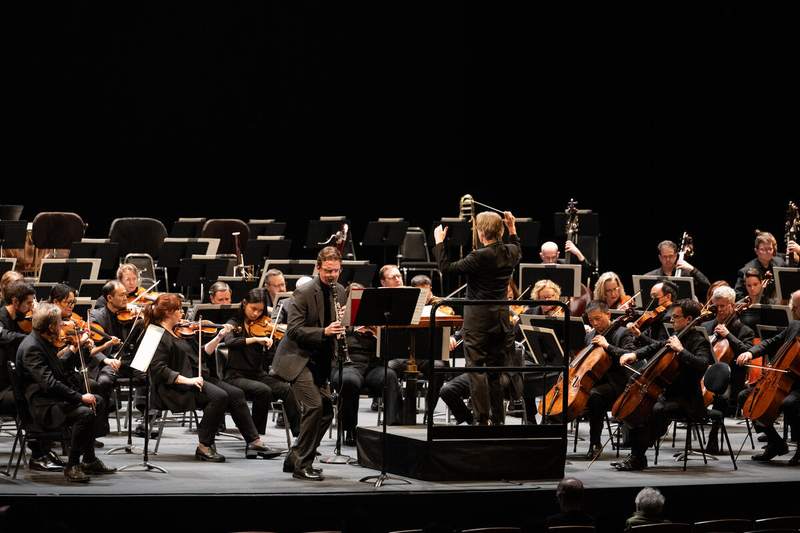
NEW AND NOVEL SOUNDS
BERKELEY—-With some 100 groups participating, the California Festival: A Celebration of New Music sprang to life with a bang as the San Francisco Symphony visited the Berkeley with all-modern music that was well-attended—a daring concert venture indeed.
When it came to the world premiere, the students in the house were vociferous in their enthusiasm, perhaps most responsive to the rock-music blended into the orchestra by the black composer Jens Ibsen with his “Drowned in Light.”
In his stimulating quarter-hour two-movement opus, Ibsen was effusive, going in many directions at once with his opus. He started with sublime drips of percussion and surged to full orchestra, intent to break away from the commonly encountered unveiling with his rambunctious venture. His orchestra was augmented by a trap set, with snatches of (amplified) electric guitar (played by Travis Andrews) that said cheekily, as if quoting the film “Wizard of Oz,” “Toto, this isn’t your usual premiere.”
The sonic blend of orchestra with classic rock was artfully spun and played out, prior to the closing “Nightswimming” (sic) part where the composer imagined a long, tranquil Pacific-shore drive, but with a heavy beat.
The work’s title alluded to a Rolo Tomassi track. Ibsen’s synesthesia brought themes to his mind to him “like bright, overwhelming light.”
The night’s longest selection was Music Director Esa-Pekka Salonen’s own half-hour long opus “Kinema” (Cinema) of 2021 for clarinet and string orchestra. This retrospective “sequence of atmospheric impressions,” as he termed them, lay somewhere between Aaron Copland and the super clarinetist of the big-band era, Benny Goodman, if I can venture my own impression. The reveries were at times jazz-inflected, flowing lyrically from the solos of the ensemble’s own principal clarinet, Carey Bell, who played almost nonstop with a clean technique and languorous flow. In the midst of the five movements came “Perotin dream,” an homage to the French composer of eight centuries ago who had broadened the harmonic pallette.
The concert closed with Stravinsky’s angry reaction to World War Two, “Symphony in Three Movements,” a grim testament in which you can almost feel the tanks roaring into battle. Salonen’s conducting brought out all the sinew of this demonic work from the early 1940s.
MUSIC NOTES—The Ghanaian-born Ibsen, now a resident of Pacifica, proved to be among the most gregarious and articulate of composers in his on-stage introduction to his premiere, quickly and unabashedly winning over his audience. Among his career choices, there’s surely an option to be an arts-program annotator on radio.
Talking up the current California Festival, presenting 180 modern works overall, conductor Salonen noted significantly, “This is the only place in the world where this kind of event can be (brought together).”
Salonen sprinkled his concert discourse with his characteristic humor. Once, in a New Yorker interview, he had told self-deprecatingly of venturing into a bar after a matinee concert and sitting down next to an attractive young lady who did not recognize him. She asked what he did, and he casually told, “Well, this afternoon I conducted the Los Angeles Philharmonic.”
The lady shot back, “That’s the worst pick-up line I’ve ever heard,” and stalked off.
CAL PERFORMANCES presents the S.F. Symphony, with Ibsen world premiere, Nov. 10, Zellerbach Hall, Berkeley, CA. For info: (510) 642-9988, or go online, calperformances.org .